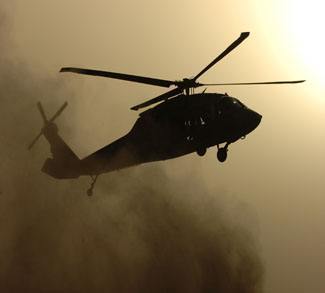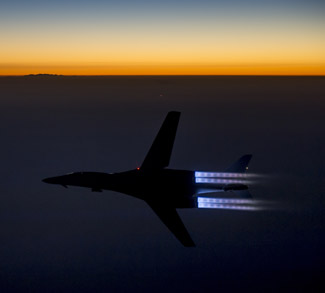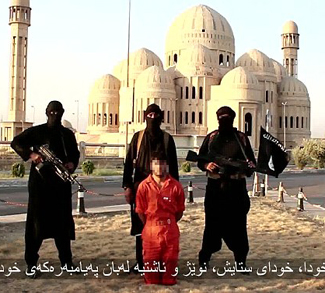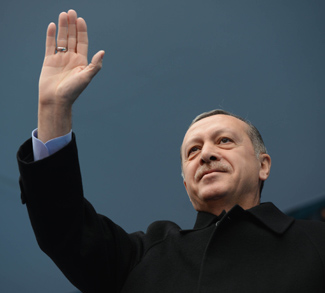A rise in sectarian violence in Iraq is complicating the struggle to form a national unity government, the first and vital step in combatting the jihadist Islamic State of Iraq and al-Sham, which is now calling itself Islamic State.
US airstrikes against Islamic State seem to have slowed the group’s momentum. When it captured Mosul, Baiji, and Tikrit in quick succession last June, Islamic State’s stunning advance was made possible by a virtually nonexistent Iraqi air force and an Iraqi army that offered no real resistance. Remarkably, two Iraqi divisions – 30,000 soldiers – capitulated to a jihadist force of just 800-2000 fighters. But as US airstrikes continue to mount, Islamic State is shifting its tactics towards blending in with the local population and adopting a traditional guerrilla warfare playbook. In an ironic twist, US airstrikes on Islamic State targets are destroying the very same US-made military equipment that Washington supplied to Iraq, which the militant group inherited when it captured Mosul, a reality that highlights the United States’ failure in post-Saddam Iraq.
In light of the recent execution of American journalist James Foley and Islamic State’s threats against US interests, Obama is poised to expand US airstrikes into Syria, a stark reminder that the group cannot be contained in Iraq while simultaneously being ignored in Syria, where it uses the obsolete Iraq-Syria border to move resources to wherever they are required. Pragmatism dictates that effective airstrikes against Islamic State strongholds in Syria require back channel coordination with the Assad regime. Achieving US security interests will require at least a temporary marriage of convenience with Assad in order to confront the transnational threat posed by Islamic State.
The Preamble to the Fall of Mosul
Although several factors contributed to the crisis in Iraq, Maliki’s leadership was chief among them. As soon as the last US troops left Iraq in December 2011, Maliki found an opportunity to consolidate his power by targeting Sunni leaders and opposition members. Among other controversial moves, he ordered the Interior Ministry to issue an arrest warrant for Iraq’s Sunni vice president, Tariq al-Hashimi, on charges of terrorism. Hashimi managed to flee to the Kurdish-controlled north. Maliki also threatened Sunni Deputy Prime Minister Saleh al-Mutlaq with arrest when Mutlaq publicly criticized the prime minister for his authoritarian rule.
The targeting of such senior politicians in Iraq has left a sour taste in the mouths of Iraq’s Sunnis.
Tensions reached a boiling point in December 2012 when security forces raided the home of a Sunni finance minister and arrested 10 of his bodyguards. Protests against the incident erupted in Fallujah and spread to other Sunni-majority cities. Instead of engaging with the opposition, Maliki ordered a crackdown on the protests, leading to fierce clashes between demonstrators and security forces. Anti-government protests continued over the next two years, with protesters demanding an end to Maliki’s sectarian policies. Even Muqtada al-Sadr, a Shia cleric and an influential political figure, condemned Maliki’s crackdown and voiced support for the protests, referring to them as “the Iraqi spring.” Sunni leaders in places like Anbar Province viewed the Iraqi army as being an exclusively Shia force that was being used as Maliki’s tool to subdue and marginalize the Sunnis. They pointed to Maliki’s reluctance to disarm Shia militias in Baghdad as proof of his exclusivist sectarian agenda. Maliki also derided Sunni tribesmen in Al-Anbar and Nineveh when they proposed the creation of local security forces that were more representative of their population.
Maliki’s discriminatory policies and authoritarianism bred resentment among Iraq’s Sunnis, allowing Islamic State to exploit local grievances to its advantage. Some of Mosul’s residents preferred Islamic State over the Maliki regime because the latter was viewed as an occupying force that conducted arbitrary arrests whereas Islamic State assured Mosul’s residents to remain calm, promising to restore services like electricity – at least initially.
Yet Mosul’s residents are now growing frustrated with Islamic State’s repressive rule. The new Iraqi government must capitalize on this growing resentment. It must address the legitimate grievances of Iraq’s marginalized communities, including the lack of jobs. Cities between Baghdad and Mosul may very well degenerate into inhospitable, ungovernable territories for years to come, but a national unity government must work hard to prevent that from happening.
The Delicate Balance between Strategy and Tactics
US airstrikes and joint Iraqi-Kurdish coordination on the ground will help curtail Islamic State’s momentum. President Obama will also try to avoid mission creep since one of his proudest foreign policy achievements thus far has been the withdrawal of US forces from Iraq. Although it is unlikely that the United States will resend regular forces, the US Special Forces that are acting as “military advisers” in Iraq may soon be clashing directly with Islamic State, repelling their fighters from strategic locations and targeting the group’s command structure. With help from US air cover, Iraqi forces will remain responsible for the bulk of the fighting against Islamic State. While the resurgence of Shia militias, like Muqtada al-Sadr’s Mahdi Army (renamed the “Peace Brigades”), seems like a necessary step in combating Islamic State, Baghdad must caution against giving the militias free reign so as not to exacerbate sectarian tensions.
The Iraqi army, however, is not strong enough to combat Islamic State on its own. The key power-brokers here are Iraq’s Sunni political leaders and tribal sheikhs. Rewind to the summer of 2006 when the US enlisted the help of Sunni tribesmen in Anbar Province to push back the predecessor to Islamic State, al-Qaeda in Iraq (AQI), which had been waging a two-year insurgency against US and Iraqi security forces (ISF). By 2007-08, the Sunni Awakening movement, later known as the Sons of Iraq, had significantly altered the balance of forces and dealt a devastating blow to AQI.
By 2010, a portion of the Awakening movement was incorporated into the ISF, but suspicion of its members’ loyalty and fears that it might challenge the Maliki government’s legitimacy in the future caused friction between Baghdad and the Sunni-majority provinces. The Sons of Iraq were not adequately integrated into Iraq’s security apparatus, leading to a security vacuum that, by the time protests erupted in Anbar Province in 2012, permanently damaged the Sunni population’s relations with the Iraqi state. It is in this context that Islamic State and other Sunni insurgent groups, along with former Ba’athists, were able to exploit Sunni grievances with Maliki’s leadership, capturing cities with little to no resistance from local populations. Local discontent had been brewing long before Mosul’s fall, and Sunni insurgents had been gaining ground for months. The failure of governance from Baghdad has been a primary factor in the disintegration of Iraq.
Enlisting the help of Sunni tribesmen this time around will prove much more difficult, but a new Iraqi government has no choice – it must engage with the Sunnis in Anbar, Nineveh, and Saladin in order to break the grip that Islamic State and other Sunni insurgents have on cities in these provinces. Islamic State is certainly not omnipresent in all Sunni-majority cities. In places like Haditha in Anbar, tribesmen have refused to let their city fall to the group. Several tribal leaders in Anbar have offered to rebel against Islamic State in exchange for concessions from Baghdad, including greater autonomy and the withdrawal of Iraqi military forces. Top Sunni officials are already in the planning stages of an effort backed by the US to finance and recruit localized professional security forces in Anbar rather than tribe-driven militias.
The greatest stumbling block to national unity was Maliki’s refusal to step down. Thus his resignation, in part due to pressure from Grand Ayatollah Ali Sistani, is a major step forward. But more needs to be done, and a strategy aimed at defeating Islamic State – rather than simply containing it – must go beyond the projection of military force and counterterrorism operations. Only in a commitment to the political inclusion of Iraq’s disenchanted Sunnis, and their treatment as equal citizens, can Sunni confidence in the state gradually be restored.
Multiple Fault Lines: The Kurdish Question
The crisis in Iraq goes beyond Sunni-Shia friction. There is also an ethnic divide between Arabs and Kurds that has deepened Iraq’s fragmentation. Since the 1990s, Iraqi Kurdistan has enjoyed considerable autonomy from Baghdad, in large part due to the US-led no-fly zone imposed on Iraq in response to the Ba’ath regime’s crackdown on the 1991 Kurdish uprising. Last July, Masoud Barzani, the president of the Kurdish Regional Government (KRG), asked the Iraqi Kurdistan Parliament to prepare for a referendum on independence. Baghdad’s weakness has allowed the Kurds to demand greater concessions from the central government, which they were hitherto unable to secure. Kurdish assertiveness has been bolstered by the Peshmerga’s capture of the disputed oil-rich city of Kirkuk – often considered to be the “Kurdish Jerusalem.”
As part of its “one Iraq policy,” Washington does not officially support the KRG’s export of oil via Turkey without Baghdad’s consent. In early 2014, Baghdad halted payments to the KRG, allocated at 17 percent of the national budget, in retaliation for Erbil’s unilateral negotiation of oil contracts. As a result, Erbil has lost approximately $1 billion a month, straining the KRG’s ability to pay its civil servants and security forces. The failure of Baghdad and Erbil to strike an oil-revenue sharing deal signals a crisis of Iraqi federalism. To complicate matters, Iraq’s constitution remains ambiguous on the issue. Washington also does not directly supply heavy weaponry to Erbil without going through Baghdad. But the advance of Islamic State has slowly altered this policy and the CIA is said to be directly funneling non-US weapons to Peshmerga forces battling the militants.
One problem with relying on the Peshmerga to defeat Islamic State is that Erbil’s interests usually do not extend beyond Kurdish-held or disputed territory. Naturally, it is the responsibility of Iraq’s national army to defend Iraq’s territorial integrity, not the Peshmerga (a regional security force). In addition, the fighting prowess of the Peshmerga, with its fearsome reputation as a professional military force, was called into question in early August when Islamic State seized towns under Kurdish control. Yazidis and Assyrian Christians in the town of Sinjar felt betrayed when the Peshmerga retreated in the face of a jihadist advance, forcing tens of thousands to remain stranded on Sinjar Mountain without food or water. Sinjar, however, is part of Nineveh, and not the Kurdish region. The Peshmerga has certainly helped rescue thousands from Sinjar, but those districts under Kurdish control in Nineveh, such as Aqra and northern Shekhan, act mainly as buffers between Islamic State-held territory and Iraqi Kurdistan that Erbil could use as a bargaining chip in future negotiations with Baghdad.
Dealing with the humanitarian catastrophe that Islamic State’s genocidal campaign has wreaked on Iraq’s vulnerable minorities, including the Assyrians and other Christians, Yazidis, Mandaens, Turkmen, and Shia Shabak, will be another challenge. The United States has provided crucial humanitarian aid to those stranded on Sinjar Mountain, but more is needed. Rather than flee their indigenous homeland, some Assyrian towns are setting up local defense forces since relying solely on Iraqi army or Pershmerga protection is proving futile. One solution is to form a safe haven in the province of Nineveh where the region’s minorities can set up a self-administrative council and coordinate on matters of security and general welfare. The country’s minorities are an integral part of Iraq’s history and society; any effort to resolve Iraq’s crisis cannot overlook their plight.
Stuck Between Saudi Arabia and Iran
There is also a regional element to Iraq’s unfolding crisis. Iraq is a battleground for influence between the two major Gulf powers, Iran and Saudi Arabia. The Saudi-Iranian rivalry intensified after the fall of Saddam Hussein’s regime in 2003. In Iraq, Tehran’s patronage extends to Shia strongholds in the south and Shia militias in Baghdad, whereas Riyadh seeks to maintain links to Sunni tribal leaders in Iraq’s predominantly Sunni provinces in order to mobilize Arab sentiment against Persian influence. These proxy battles, also waged in Syria, Bahrain and Lebanon, are part of a much broader security competition where Tehran and Riyadh are vying to exert their regional influence and secure the loyalty of local elites.
Although the Saudis have bolstered the Sunni opposition fighting against the Assad regime in Syria, the issue is more complicated in Iraq, which shares a border with Saudi Arabia along the latter’s northern frontier. While Saudi officials have turned a blind eye to the funding of Islamic State by private donors inside the Kingdom, Riyadh is showing signs of wariness in light of the group’s territorial gains and its threat to overturn the regional status quo. The group’s momentum has put Saudi Arabia between Iraq and a hard place. The Saudi leadership does not particularly like the Shia-dominated central government with its ties to Iran, but Islamic State is not a particularly reliable proxy group. Jihadist-held territory in close proximity to Riyadh and Islam’s holiest cities, Mecca and Medina, which the self-styled caliphate would undoubtedly seize if had the opportunity, has troubled the Saudi regime. Saudi leaders are beginning to fear that the policy of tacitly approving Islamic State’s jihad against Iranian-friendly regional governments could soon come back to haunt the Kingdom.
Interestingly, Iran and the United States stand on the same side of the conflict in Iraq. The crisis provides both states with an opportunity to cooperate against a group that threatens both their strategic interests. Cooperation would come on the heels of Iran’s compliance with the Geneva interim nuclear agreement signed last November. US-Iran cooperation on Iraq would signal a major breakthrough in the normalization of relations that were severed in 1979. In turn, this would gradually lead to regional stability. Those who scoff at the idea overlook the fact that cooperation between the United States and the Islamic Republic is nothing new. At the December 2001 Bonn conference, Iranian officials helped the United States form a new Afghan government, playing a constructive role in the formation of an interim constitution and convincing key players in the Northern Alliance to make political concessions for the sake of expediency. Despite this support, President Bush added Iran to the list of states in the “Axis of Evil.” He rejected Iranian overtures in 2003, essentially closing a valuable avenue of strategic cooperation. The Obama administration must not make the same mistake. It must seize the historic opportunity to break down the wall of mistrust and undo decades of animosity between the two states.
The fall of Mosul at the hands of radical Islamists will be recorded in the history books. The dismantlement of the Iraq-Syria border will have permanent effects on the region’s political landscape. The area between Mosul and Baghdad, a virtual security vacuum, may remain ungovernable for years to come. But the battle for Iraq goes beyond the fight against Islamic State. Any incoming government must restore the confidence of Iraq’s minority communities and instill a sense of Iraqi national unity so that extremists cannot exploit sectarian grievances to their advantage. The situation in Iraq cannot be normalized until the root of the problem is addressed. This is more than just a battle against transnational jihadists; it is also state-building struggle that has been unfolding since the creation of modern Iraq in 1920.
The next few months will be crucial in deciding Iraq’s path in the coming decades.




